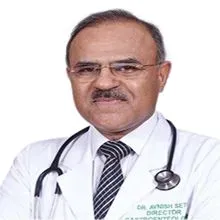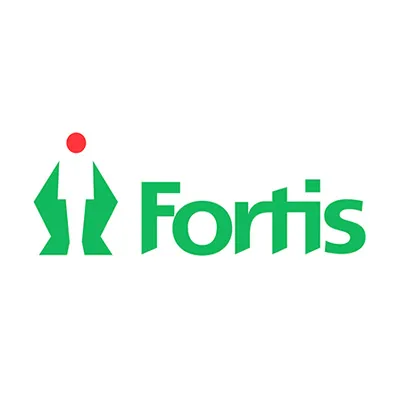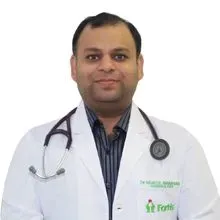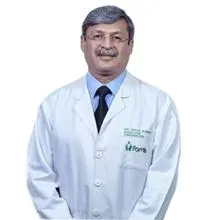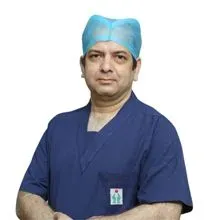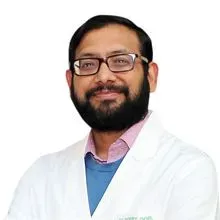About Doctor DR. AVNISH KUMAR SETH
Dr. Seth, an alumnus of Armed Forces Medical College in Pune, earned his MD (Medicine) from Pune University and his DM (Gastroenterology) from PGIMER in Chandigarh. He holds fellowships in liver transplantation (Birmingham, UK) and advanced GI endoscopy and endoscopic
ultrasound (South Carolina & Alabama, USA), and he has served on the Governing Councils of the Indian Society of Gastroenterology (ISG) and the Society of GI Endoscopy of India (SGEI). He has over 100 publications to his name and is a recognised teacher for MBBS, DNB(Medicine), and currently DNB(Gastroenterology). Dr. Seth, the Best Gastroenterologist in Delhi, is a member of the National Organ & Tissue Transplant Organization's Apex Technical Committee and an Advisory Board member of the Multi Organ Harvesting Aid Network (MOHAN) Foundation.
Work Experience:
42 Years’ Experience
Dr. Avnish Seth is the head of Fortis Organ Retrieval and Transplantation (Fort) and the director of Gastroenterology and Hepatobiliary Sciences at Fortis Memorial Research Institute in Gurgaon. He then served as a consultant to the Armed Forces in Gastroenterology and Hepatobiliary Sciences, with a focus on advanced GI Endoscopic operations and liver problems. In 2004, he was hired as the director of the department at the prominent army hospital (research and referral) in New Delhi, where he was designated as the President of India's Gastroenterologist. In 2004, he launched the DNB (Gastroenterology) programme. In 2006, he completed a six-month Fellowship in Liver Transplantation in the United Kingdom and started a successful liver transplant programme at the army hospital.
Associated with Hospitals:
Manipal Hospital
List of Treatments:
-
Anti-Reflux Procedures: This type of procedure is used for the treatment of conditions in which food or stomach acid flows back up into the esophagus from the stomach. This entails stitching the hole in your diaphragm shut to prevent your stomach from bulging upward through the muscle wall opening. To strengthen the healed region, some surgeons insert a piece of mesh. Stitch the upper section of your stomach around the end of your esophagus.
-
Lap Cholecystectomy - Gallbladder Removal: It is a type of procedure in which the gallbladder is usually removed during a cholecystectomy by introducing a tiny video camera and specific surgical equipment through four small incisions in your belly. This is known as a laparoscopic cholecystectomy. In certain circumstances, the gallbladder may be removed by a single big incision.
-
Hepatitis B Treatment: Hepatitis B is caused by hepatitis B virus. Hepatitis B is transmitted when blood, sperm, or other bodily fluids from an infected person enter the body of an uninfected person. Antiviral medicines may be used to treat chronic hepatitis B. However, Orthotopic liver transplantation, on the other hand, is the therapy of choice for patients with fulminant hepatic failure who do not recover and for individuals with end-stage liver disease related to hepatitis B.
-
Hepatitis C Treatment: Hepatitis C is a liver inflammation caused by the hepatitis C virus. Direct-acting antiviral (DAA) pills are used to treat Hepatitis C. DAA pills are the most effective and safest drugs for treating hepatitis C. However, chronic hepatitis C is treated by liver transplantation. During a liver transplant, your diseased liver is removed and replaced with a healthy liver.
-
Liver Cirrhosis Treatment: Cirrhosis is a disorder that causes your liver to scar and become permanently damaged. Scar tissue replaces good liver tissue, preventing the liver from functioning correctly. Cirrhosis causes your liver to fail as it progresses. Treatment include medications such as diuretics and liver transplant in chronic conditions.
-
Biliary Drainage and Stenting Surgery: Biliary drainage is a treatment that aids in the removal of excess bile. When bile becomes clogged in the bile duct, it can back up into the liver, causing symptoms such as jaundice. A biliary drain is a thin, hollow tube having many perforations along its length which facilitates bile flow.
-
Whipple Surgery: It is a complicated procedure that involves removing the pancreatic head, the first section of the small intestine (duodenum), the gallbladder, and the bile duct. The Whipple surgery is used to treat tumors and other pancreatic, intestinal, and bile duct diseases.
-
Appendectomy: If you have appendicitis, your appendix will be removed. When the appendix becomes infected, surgery is performed to remove it. Appendicitis is the medical term for this ailment. An appendectomy is a frequent emergency procedure. The appendix is a small pouch connected to the big intestine. It is located in the bottom right quadrant of your abdomen.
-
Hemorrhoidectomy: A hemorrhoidectomy is surgery to remove internal or external haemorrhoids. These are anal veins that have swelled. During this procedure, the doctor will remove the enlarged veins. Surgery is rarely used as the first line of therapy. When everything else fails, hemorrhoidectomy is a safe, effective procedure that does more than merely make haemorrhoids less bothersome.
-
Nissen fundoplication: A Nissen fundoplication is a surgical procedure that is used to treat gastroesophageal reflux disease (GERD). To avoid acid reflux, a surgeon constructs a sphincter (tightening muscle) at the bottom of the oesophagus during the surgery.To avoid acid reflux, the operation tightens the connection between the oesophagus and the stomach.
-
Endoscopy: An endoscopy is a procedure that allows you to see within the structure of your body. An endoscope is a long, thin tube with a tiny camera inside that is introduced into your body through a natural orifice such as your mouth. If you have specific symptoms, your doctor may recommend you for an endoscopy. It is normally performed in a hospital endoscopy unit.
Awards and Recognitions:
-
Awarded Vishisht Seva Medal for distinguished service by the President of India - 2009
-
Best paper during National conference of Indian Society of Gastroenterology in 2006 and Society of GI Endoscopy of India in 2007
-
Seth AK. HBsAg quantification in clinical practice. J Experimental Clin Hepatol - 2012
-
Seth AK, Mazumder S, Khanna S. Colonoscopic instillation of coca cola for treatment of fecal impaction. Indian J Gastroenterol 2011;30:A122
-
Seth AK, Gunson B, Mirza D, Haydon G. Thrombcytosis in liver transplant recipients: prevalence, natural history and impact. Liver transplantation – 2007
Publications:
-
Colonoscopic Instillation of Coca-Cola for evacuation of large fecaloma: A report of two cases and review of literature. J Health Allied Sciences 2022;12:98-100.
-
Efficacy of Fecal Microbiota Transplant in Patients with Moderate or Severe Irritable Bowel Syndrome in India. Tropical Gastroenterology 2021;42(4):189-197.
-
Fecal microbiota transplantation for induction of remission, maintenance and rescue in patients with corticosteroid-dependent ulcerative colitis: a long-term follow-up real-world cohort study. Intestinal Research 2022 (In Press)
-
Endoscopic Insufflation–Induced Gastric Barotrauma during Percutaneous Endoscopic Gastrostomy: A Report of Three Patients and Review of Literature. Journal of Digestive Endoscopy, 2021, 12(02), 103–106.
-
Recurrent Acute Pancreatitis following Colonoscopic Fecal Microbiota Transplantation for Ulcerative Colitis. Journal of Health and Allied Sciences NU 2021
Education & Training:
-
MBBS - Armed Forces Medical College (AFMC), Pune, 1981
-
MD - General Medicine - Armed Forces Medical College (AFMC), Pune, 1989
-
DM - Gastroenterology - POSTGRADUATE INSTITUTE OF MEDICAL EDUCATION AND RESEARCH, CHANDIGARH, 1995
Trainings/Specializations:
Gastroenterologist
Membership:
-
American Association for study of Liver Diseases
-
Society of GI endoscopy of India
-
Indian Society of Gastroenterology
-
Government of India committee on National guidelines for liver transplantation
-
Indian National Association for Study of Liver
Registrations:
-
24601 Delhi Medical Council, 1981
-
7363 Haryana State Medical Council, 2013
Specialty Interests:
-
Diagnostic & Therapeutic GI Endoscopy
-
Colonoscopy
-
ERCP
-
Liver Transplantation
-
Stool Transplant (FMT) GI bleeding
-
Ulcerative Colitis & Crohn’s Disease, etc.
 Associated with hospitals
Associated with hospitals
Envisioning the goals & paving the path to success for the organization.
Book Appoinment
Similar Doctors In Delhi, Gurgaon
Envisioning the goals & paving the path to success for the organization.










